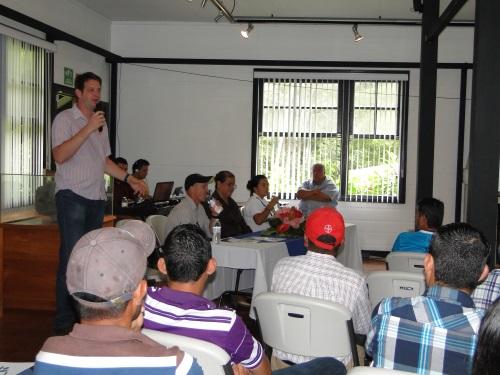From the Field Managing Panama disease in Costa Rica and Nicaragua

A toolbox for farmers to reduce banana yield loss caused by Panama disease, prevent its spread and promote awareness of this devastating fungal disease.
A toolbox for farmers to reduce banana yield loss caused by Panama disease, prevent its spread and promote awareness of this devastating fungal disease.
Nancy Chaves, Bioversity International Research Fellow, reports from Costa Rica.
The Latin American and Caribbean region experienced one of the most devastating plant disease epidemics in history. In the 1950s, Fusarium wilt of banana, a fungal disease known also as Panama disease, wiped out large production areas of Gros Michel, the export banana variety at the time. The disease is particularly devastating because the fungus remains in the soil for decades. Millions of smallholder farmers in this region still depend on varieties susceptible to Fusarium wilt, threatening their food security and livelihoods.
From 2013 to 2015, Bioversity International scientists, in collaboration with partners from Embrapa, have been working with 18 producers in the area of Turrialba, Costa Rica, and Tola, Nicaragua, to strengthen their capacity on sustainable land management, Gros Michel banana cultivation and Fusarium wilt management.
The objective of this project was to reduce banana yield loss caused by Fusarium wilt and prevent its further spread in 18 banana-dependent smallholder farms in Costa Rica and Nicaragua. We established fifteen experimental plots in three different locations in Turrialba (five farms per area) and three in Tola. Using participatory approaches, we carried out workshops highlighting good agricultural practices, disease epidemiology, integrated crop management and techniques for experimentation. Use of disease-free planting materials, beneficial microorganisms, organic matter and soil health-oriented fertilization were among the tested treatments. We also evaluated plant growth variables (number of leaves, plant height, pseudostem diameter and percentage) and disease intensity.
On 15 April, we carried out the final workshop were we discussed the project’s achievements. As a result of the interventions, farmers have significantly improved their knowledge about Fusarium wilt disease and management. They have also shared their experiences with neighbors through group training events, farmer field days and informal exchange, resulting in a minimum of 50 farm families as direct beneficiaries in Costa Rica and Nicaragua. The successful practices on Fusarium wilt management can also be transferred to other crops, amplifying the soil health concept in the entire farm.
The project has created awareness on Fusarium wilt in banana, helping farmers to reduce losses and preparing them for an eventual entrance of other strains of the disease that have not reached Latin America yet. Farmers now have a toolbox of validated practices for enhanced soil health and management of Fusarium wilt in banana as a strategy for disease suppression and increasing productivity.
The experience and knowledge obtained after these two years of work empowered the participant producers. Walter Sánchez Rodríguez, a banana farmer from Grano de Oro town in Turrialba, said that he learned to recognize the disease and how to prevent its spread. Farmers also expressed their interest in continuing the process – it could involve more farmers and be expanded into other crops susceptible to Fusarium wilt.
One of the most relevant results was the willingness of farmers to form a producers' alliance to facilitate access to training, funding and marketing their product.
For more information please contact Nancy Chaves.
The project was funded by the MARKETPLACE platform led by Embrapa and partners. The MKTPlace Agricultural Innovation is an initiative supported by various organizations to gather experts from Brazil, Africa, Latin America and the Caribbean to implement cooperative research projects for development. The aim of the initiative is to benefit small farmers through innovation through collaboration with partners in the region.
